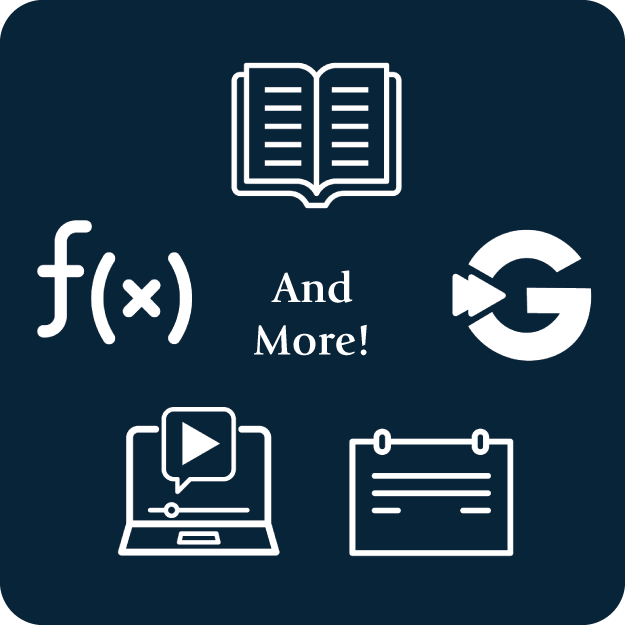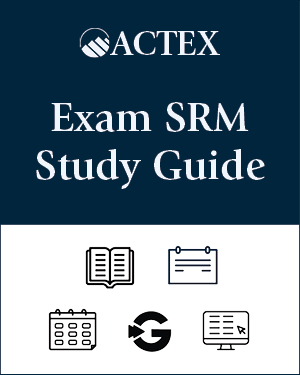Availability
In-StockISBN
Digital: 6 month license - 979-8-89016-265-6 Digital: 12 month license - 979-8-89016-266-3 Printed & digital: 6 month license - 979-8-89016-267-0 Printed & digital: 12 month license - 979-8-89016-268-7Currency
All prices shown in USDDigital Terms
Click here to view our digital terms.A new product will be added to your cart each time you click the Product button. If additional options exist (checkboxes) to further customize your product and you'd like to choose one of the them, please select the option before clicking the product button to add to your cart. Click here to edit your cart.
Eliminate Risk and Ensure Success in Exam SRM.
- Study manual - read, learn and gain a strong conceptual understanding of the material
- GOAL - Practice, quiz and text with thousands of problems and solutions
- Instructional Videos - gain deep understanding and visuals to bring extra to your learning
- Flashcards - master key topics and formals and be that much more prepared
- Formula sheets - Recall important formulas and information in an easy to use format
- Bonus Content - hyperlink to Open source book


Our Study Manual for SOA Exam SRM offers personalized learning on a schedule that works for you.
The Exam SRM study manual will allow you to:
- Review 1,000 pages of comprehensive, exam-focused information with full syllabus coverage
- Refine your understanding with 213 examples
- Practice until you're confident with 462 exercises
- Get exam-ready with 6 full-length exams
GOAL: Practice. Predict. Pass.
Reach your target GOAL Score with our proven system.
GOAL offers:
- 1,200+ SOA exam practice problems with detailed solutions
- A variety of learning modes and difficulty levels
- Customized quizzes: You set the topic, difficulty, number of questions, and a timer
- Simulated exams: Choose from 7 comprehensive exams (Including 2 challenge exams)
- Measure your preparedness with GOAL Score


Instructional Videos
Retain more information with our helpful videos that cover the entire syllabus and further explain the most complex topics.
We've got you covered with:
- 40 instructional videos
- A variety of expert instructors, many of whom are current university professors
- Almost 6.5 total hours of video content—with more to come
- Now with closed captions in both English and Spanish to make learning more accessible!
Flashcards
Master key topics and formulas with our flashcards, which are rated by exam importance.
- Nearly 250 Virtual Flashcards—great for on-the-go studying!
- Cover critical syllabus material to help you pass your exam.
- Great way to help you learn key topics and formulas.
- Allow you to sort by topic to focus on the material you need to work on the most.


Planner
Weighted by topic importance, our Planner clearly outlines how to study for Exam SRM
- Simplify study sessions with Planner's ability to filter videos, flashcards, and GOAL for relevant content, based on where you're at in the manual
- Weighted sections highlight how long you should spend on each topic
- Mark sections as Completed so you have a handy checklist of remaining study materials
Topic Search
Everything in the SOA Exam SRM study manual is fully indexed by keyword, making it easy to toggle between materials and concepts without losing your place.
- Seamlessly read, watch and practice across topics
- Connect to all your materials, identify problem areas, and get the help you need to pass


Formula and Review Sheet
This at-a-glance tool helps you memorize and recall key formulas and information.
- Covers important formulas needed to prepare you for the actuarial probability exam
- Easy-to-print reference guide you can study with, no matter where you are
ACTEX Learning Bootcamp Sitting Information:
|
Exam SRM Sitting |
Session 1 |
Session 2 |
Session 3 |
|
May 2026 |
5/2 |
5/9 |
5/16 |
|
September 2026 |
8/8 |
8/15 |
8/22 |
Sessions will begin at 10 am ET. Sessions last two hours, with an additional 30 minutes for questions at the end.
Optimize your Study Time for Exam SRM with the ACTEX Bootcamps.
It is the perfect addition to your study schedule and will help you feel confident and ready for your exam.
Interact with the instructor and other students during this three-session online instruction course offering:
- Review of exam material and exam strategies
- Special focus on more challenging topics and common errors
- Walk-throughs of key examples
- On-demand recordings of the sessions available for later review
- Email access to instructors for Q&As
About Your Professors
Dr. Jiayue Zhang, who holds a PhD in Statistics from the University of Waterloo, focuses on assessing climate change impacts and associated risks, with applications in finance and insurance. In July 2024, she earned the Associate of the Society of Actuaries (ASA) designation. Dr. Zhang is set to begin her career as a quantitative strategist at Morgan Stanley, leveraging her expertise in statistical modeling and risk analysis to address challenges in the financial industry.
Dr. Yuanyuan Zhang holds a PhD in Actuarial Science from the University of Waterloo and is an Associate of the Society of Actuaries (ASA). A recipient of the prestigious James C. Hickman Scholarship (awarded to only six globally by the SOA), Dr. Zhang brings expertise in actuarial modeling, advanced analytics, and AI-driven solutions. Currently, he serves as a data scientist at an insurance AI consulting firm, leveraging his technical skills and deep industry knowledge to drive innovation and deliver impactful insights.
About the Authors
Runhuan Feng, PhD, FSA, CERA
Runhuan Feng is a professor and the Director of Actuarial Science Program at the University of Illinois at Urbana–Champaign. He obtained his PhD in Actuarial Science from the University of Waterloo, Canada. He is a Helen Corley Petit Professorial Scholar and the State Farm Companies Foundation Scholar in Actuarial Science. Prior to joining Illinois, he held a tenure-track position at the University of Wisconsin-Milwaukee. Runhuan has published extensively on stochastic analytics in risk theory and quantitative risk management. Over the recent years, he has dedicated himself to developing computational methods for managing market innovations in areas of investment combined insurance and retirement planning. He has authored several research monographs including An Introduction to Computational Risk Management of Equity-Linked Insurance.
Daniël Linders, PhD
Daniël Linders is an assistant professor at the University of Illinois at Urbana-Champaign. At the University of Leuven, Belgium, he obtained an M.S. degree in Mathematics, an Advanced M.S. degree in Actuarial Science and a PhD in Business Economics. Before joining the University of Illinois, he was a postdoctoral researcher at the University of Amsterdam, The Netherlands and the Technical University in Munich, Germany. He is a member of the Belgian Institute of Actuaries and has the Certificate in Quantitative Finance from the CQF Institute. Daniël Linders has wide teaching experience. He taught various courses on Predictive Analytics, Life Contingencies, Pension Financing and Risk Measurement.
Ambrose Lo, PhD, FSA, CERA
Ambrose Lo is the author of several study manuals for professional actuarial examinations and an Adjunct Associate Professor at the Department of Statistics and Actuarial Science, the University of Hong Kong (HKU). He earned his BSc in Actuarial Science (first class honors) and PhD in Actuarial Science from HKU in 2010 and 2014, respectively, and attained his Fellowship of the Society of Actuaries (FSA) in 2013. He joined the Department of Statistics and Actuarial Science, the University of Iowa (UI) as Assistant Professor of Actuarial Science in August 2014, and was promoted to Associate Professor with tenure in July 2019. His research interests lie in dependence structures, quantitative risk management as well as optimal (re)insurance. His research papers have been published in top-tier actuarial journals, such as ASTIN Bulletin: The Journal of the International Actuarial Association, Insurance: Mathematics and Economics, and Scandinavian Actuarial Journal. He left the UI and returned to Hong Kong in July 2023. Besides dedicating himself to actuarial research, Ambrose attaches equal (if not more!) importance to teaching and education, through which he nurtures the next generation of actuaries and serves the actuarial profession. He has taught courses on a wide range of actuarial science topics, such as financial derivatives, mathematics of finance, life contingencies, and statistics for risk modeling.
He is also the (co)author of the ACTEX Study Manuals for Exams ATPA, MAS-I, MAS-II, PA, and SRM, a Study Manual for Exam FAM, and the textbook Derivative Pricing: A Problem-Based Primer (2018) published by Chapman & Hall/CRC Press. Although helping students pass actuarial exams is an important goal of his teaching, inculcating students with a thorough understanding of the subject and logical reasoning is always his top priority. In recognition of his outstanding teaching, Ambrose has received a number of awards and honors ever since he was a graduate student, including the 2012 Excellent Teaching Assistant Award from the Faculty of Science, HKU, public recognition in the Daily Iowan as a faculty member “making a positive difference in students’ lives during their time at UI” for nine years in a row (2016 to 2024), and the 2019-2020 Collegiate Teaching Award from the UI College of Liberal Arts and Sciences.





Great manual, I’d make no changes to it. The practice problems were super helpful.





Wordings in manual are very clear, precise, and easy to follow. Dr. Lo's manual is truly remarkable!





At first I thought Actex messed up. I got so much with my study manual that I thought they made an error - many hours of videos, GOAL, flashcards, formula sheet and the offline E-Reader for my manual. No, this is what you get and honestly, it's impressive because it's all linked by keywords. You just enter a keyword and pull up information about that keyword and then click to learn more about that topic. Or you just follow the study manual or their online planner. Miles to go before I'm done, but I'm not lacking for study materials.





Yeah - what the last review said. This is a great value. And I'll say that I really like the instructors for their videos.





manual, goal and videos are integrated by keywords. I really like that feature, makes learning more about a topic easier/faster.





This is my second time using actex and felt compelled to give them a positive review. I like that I can study off-line and that my Goal Score tracks my progress. The videos are just the right pace and I use them to review concepts. They often give a different take which I like.





I've used ACTEX since college. It's the most complete manual out there. Now they've added videos and GOAL. Simply the best; highly recommended. Good luck, ya'll!





Most information doesn't always show how good actex products are. I've used both actex and Asm. Both are really good. Put in the time and your odds of passing are excellent using this manual. That's my hope at least. I've been using Goal and my score is nearly to 70 (actex target). I like the timed environment of Goal. I recommend this purchase.





Lo has a really good reputation so, I decided to buy this manual. I'm psyched. It's excellent. I'll definitely be using his PA manual and videos in the future.





I failed SRM the first time. I've used manuals and videos, switching back and forth, based on price mostly. But now, Actex has everything together with the manual, Goal question database, formula sheets, flashcards and even some calc review material. Hard to beat for the money and the Prof. Lo 's writing is clear and easy to follow.





The instructor support is really good - both the guide and goal.





I've never know ACTEX had such good online material. Really, really helpful as I work my way through the syllabus. I'm using their planner, and it’s kind of basic, but I do like how it automatically adjusts with each passing day and each time I complete a topic. And I like that I can go back and re-add that topic. I've used GOAL before and it's very helpful, especially the Score feature





what to buy for exam srm isn't an easy choice; glad I bought this because I could get the support from the author and using goal too. The videos were high quality. The Goal database of exam questions is large and covers everying; I like the Goal Score feature too - helps you attack your weaknesses and also know when to move on to new topics because you are scoring high on the current ones.





can't get any better than this srm study program; all my questions in goal were answered within a day or so. The keyword search and ability to toggle between videos, goal and the videos make this the best product out there, imo.





both the study manual and the videos are excellent - the keyword search functionality and how you can move from study manual to videos to Goal and back again is exactly what you need when you have to master concepts. I luv this





This is my 4th Actex manual; very happy with Actex if you are looking around for study manuals and videos. The GOAL database is a bit smaller than for IFM, but still has tons of exam questions and practice tests.





Borrowed a friend's manual before buying this one - matching the current syllabus. Definitely recommend it. The authors cover everything thoroughly and the video instructors (different people, but very good) have helped me understand some of the deeper connections between topics. I've used GOAL before. They've changed the interface a bit and added a few more features - the question database and solutions are very helpful.





Stat Learning etc - it's all covered with the SoA syllabus topics with great detail and excellent solutions. It's my first time using Actex, which I kinda regret. I needed far less time to study using actex. It's all here including video lectures, goal database of questions with super good support, flashcards, etc. The learning platform is the one of the very best. I used it a ton for looking up formulas. You cna just to any study tool using the search Keyword functionality which is also a great feature.


 IFoA Core Readings
IFoA Core Readings